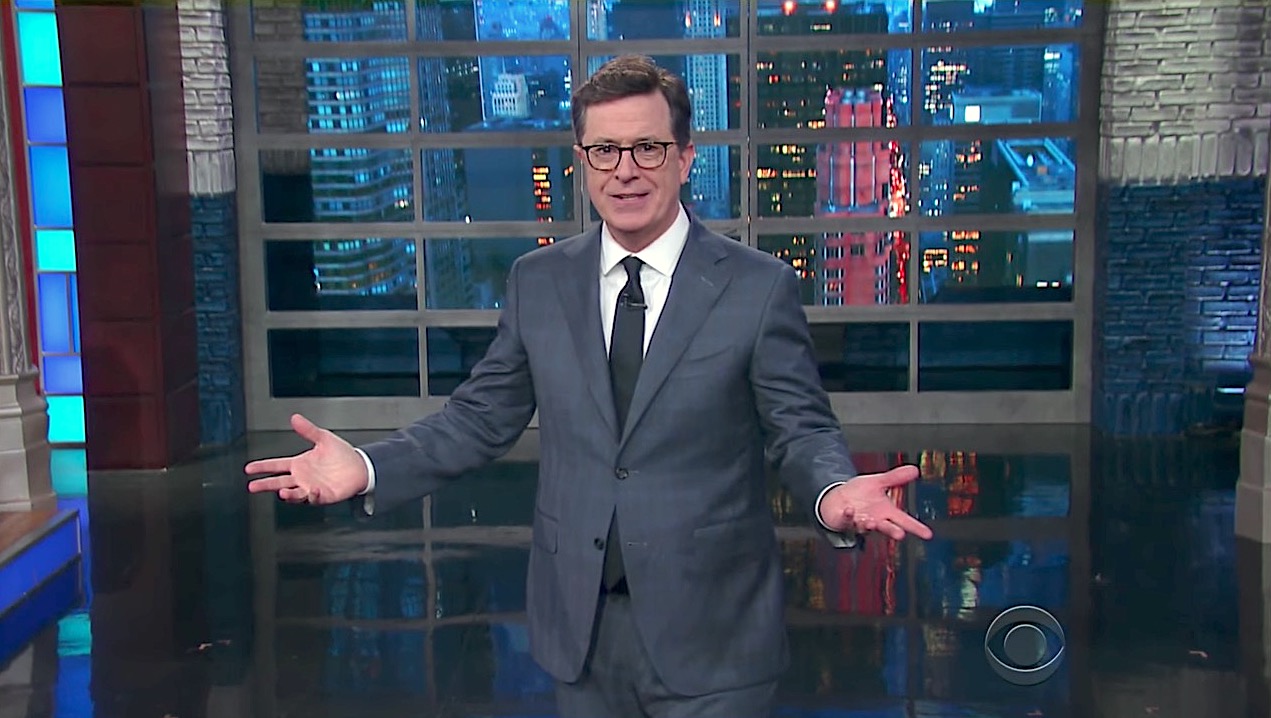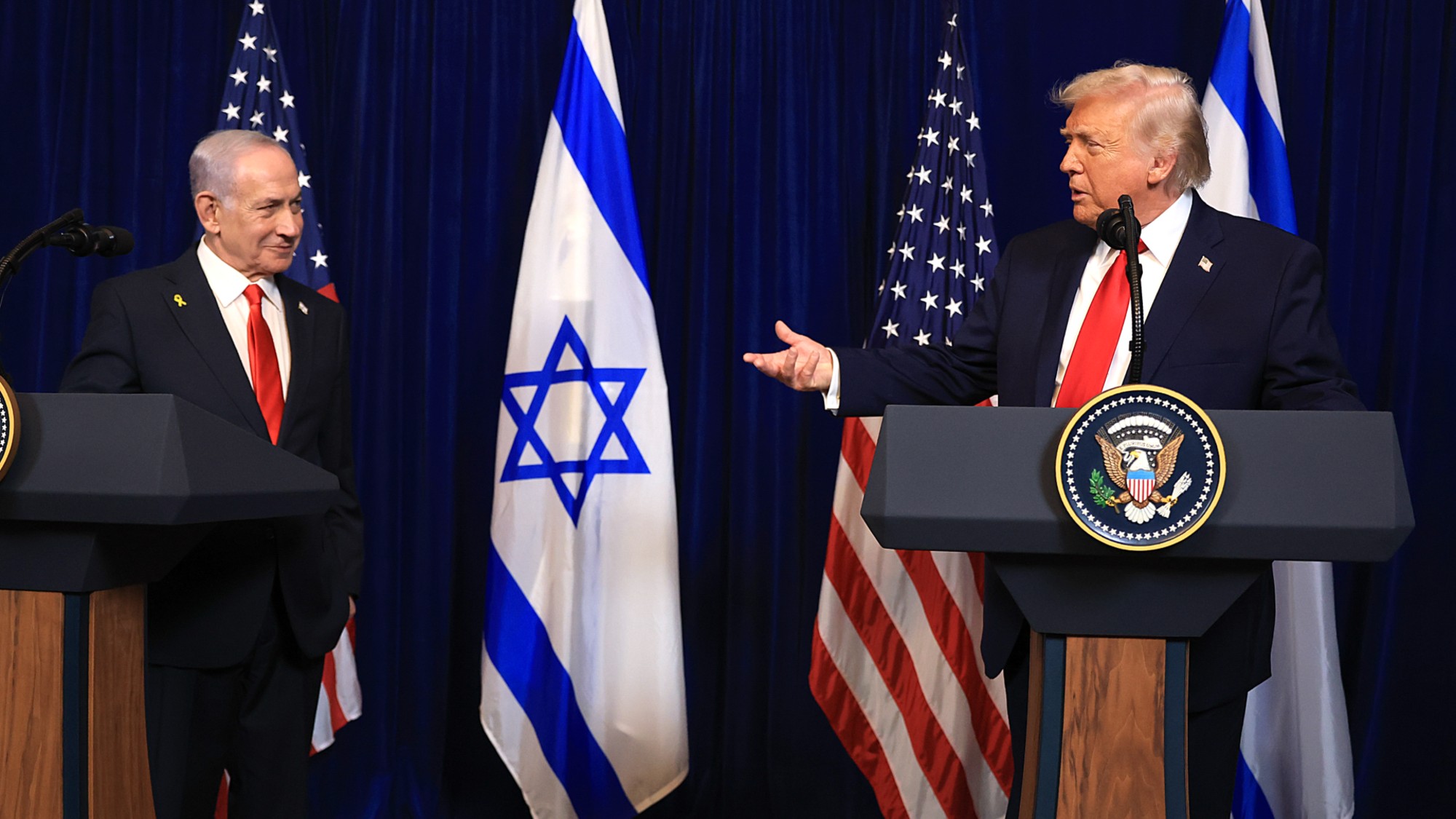Stephen Colbert says the Russia fiasco explains why Trump doesn't write murder mysteries


Elections have consequences, and right now, America is knee-deep in a "steaming pile of consequence," Stephen Colbert said on Tuesday's Late Show. "Because right now, things that are self-evidently bad are being sold to us, by people who know better, as perfectly okay." The Late Show taped before the newest scandal surrounding President Trump hit the presses, so Colbert focused on Monday's bombshell about Trump sharing highly classified information with top Russian officials, with Tuesday's updates. Reportedly, "Israel was the source of the intelligence Trump gave the Russians, and oops-a-shalom, Trump is scheduled to visit Israel next week," he said. "That is really going to be one awkward state dinner."
To tamp down the story, Trump sent out National Security Adviser H.R. McMaster with "a complete denial, by the most respected member of the Trump administration — smart strategy," Colbert said. "And following that, Donald Trump did the right thing by giving someone else the final word and not contradicting it on Twitter — I'm just kidding." In fact, Trump essentially "confessed" to spilling state secrets. "This explains why he doesn't write murder mysteries," Colbert said. "'Chapter 1: I did it.'"
"So to recap," he said, after laying out the details, "Donald Trump admitted to firing the man in charge of investigating his Russian ties, then he met with two Russian diplomats — a meeting that was arranged by Vladimir Putin, and which we only saw because Russian photographers were in there to take photos — and at that meeting, he admits he gave Russian diplomats classified information." Colbert noted some reactions from Republicans, including a pre-reaction from a certain presidential candidate who said we shouldn't allow presidents who mishandle classified and secret information in the Oval Office. "I gotta say," he said, "and I don't care if this is taken out of context, I completely agree with Donald Trump."
The Week
Escape your echo chamber. Get the facts behind the news, plus analysis from multiple perspectives.

Sign up for The Week's Free Newsletters
From our morning news briefing to a weekly Good News Newsletter, get the best of The Week delivered directly to your inbox.
From our morning news briefing to a weekly Good News Newsletter, get the best of The Week delivered directly to your inbox.
Colbert turned next to the other people affected by Trump's scandals. "I do not envy those people at the White House," he said. "I would not want to be working there right now, and apparently neither would the people who work at the White House." He interviewed one of them, and yes, there is a hedge joke in there. Peter Weber
A free daily email with the biggest news stories of the day – and the best features from TheWeek.com
Peter has worked as a news and culture writer and editor at The Week since the site's launch in 2008. He covers politics, world affairs, religion and cultural currents. His journalism career began as a copy editor at a financial newswire and has included editorial positions at The New York Times Magazine, Facts on File, and Oregon State University.
-
 Into the Woods: a ‘hypnotic’ production
Into the Woods: a ‘hypnotic’ productionThe Week Recommends Jordan Fein’s revival of the much-loved Stephen Sondheim musical is ‘sharp, propulsive and often very funny’
-
 ‘Let 2026 be a year of reckoning’
‘Let 2026 be a year of reckoning’Instant Opinion Opinion, comment and editorials of the day
-
 Why is Iran facing its biggest protests in years?
Why is Iran facing its biggest protests in years?TODAY’S BIG QUESTION Iranians are taking to the streets as a growing movement of civic unrest threatens a fragile stability
-
 A peek inside Europe’s luxury new sleeper bus
A peek inside Europe’s luxury new sleeper busThe Week Recommends Overnight service with stops across Switzerland and the Netherlands promises a comfortable no-fly adventure
-
 Son arrested over killing of Rob and Michele Reiner
Son arrested over killing of Rob and Michele ReinerSpeed Read Nick, the 32-year-old son of Hollywood director Rob Reiner, has been booked for the murder of his parents
-
 Rob Reiner, wife dead in ‘apparent homicide’
Rob Reiner, wife dead in ‘apparent homicide’speed read The Reiners, found in their Los Angeles home, ‘had injuries consistent with being stabbed’
-
 Hungary’s Krasznahorkai wins Nobel for literature
Hungary’s Krasznahorkai wins Nobel for literatureSpeed Read László Krasznahorkai is the author of acclaimed novels like ‘The Melancholy of Resistance’ and ‘Satantango’
-
 Primatologist Jane Goodall dies at 91
Primatologist Jane Goodall dies at 91Speed Read She rose to fame following her groundbreaking field research with chimpanzees
-
 Florida erases rainbow crosswalk at Pulse nightclub
Florida erases rainbow crosswalk at Pulse nightclubSpeed Read The colorful crosswalk was outside the former LGBTQ nightclub where 49 people were killed in a 2016 shooting
-
 Trump says Smithsonian too focused on slavery's ills
Trump says Smithsonian too focused on slavery's illsSpeed Read The president would prefer the museum to highlight 'success,' 'brightness' and 'the future'
-
 Trump to host Kennedy Honors for Kiss, Stallone
Trump to host Kennedy Honors for Kiss, StalloneSpeed Read Actor Sylvester Stallone and the glam-rock band Kiss were among those named as this year's inductees
